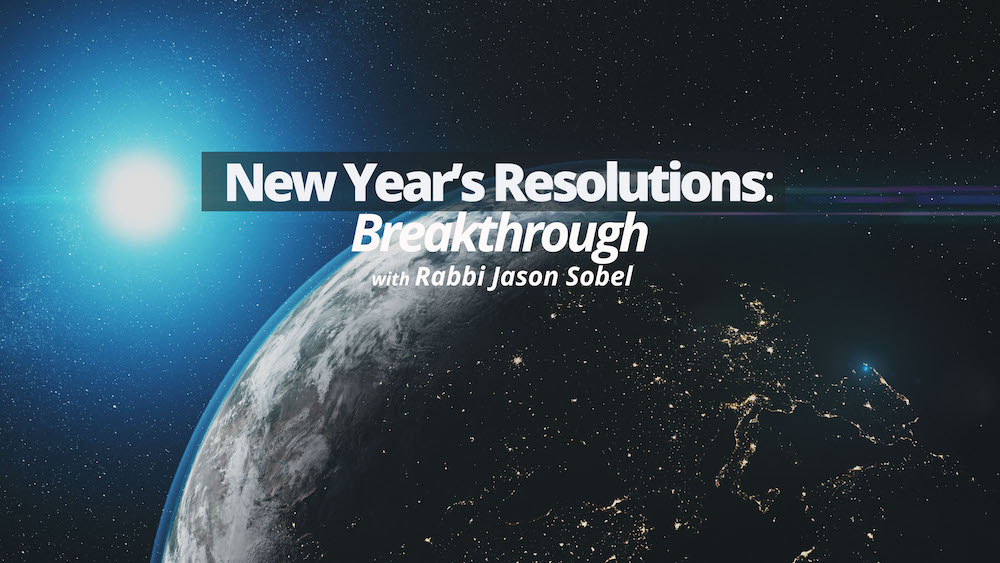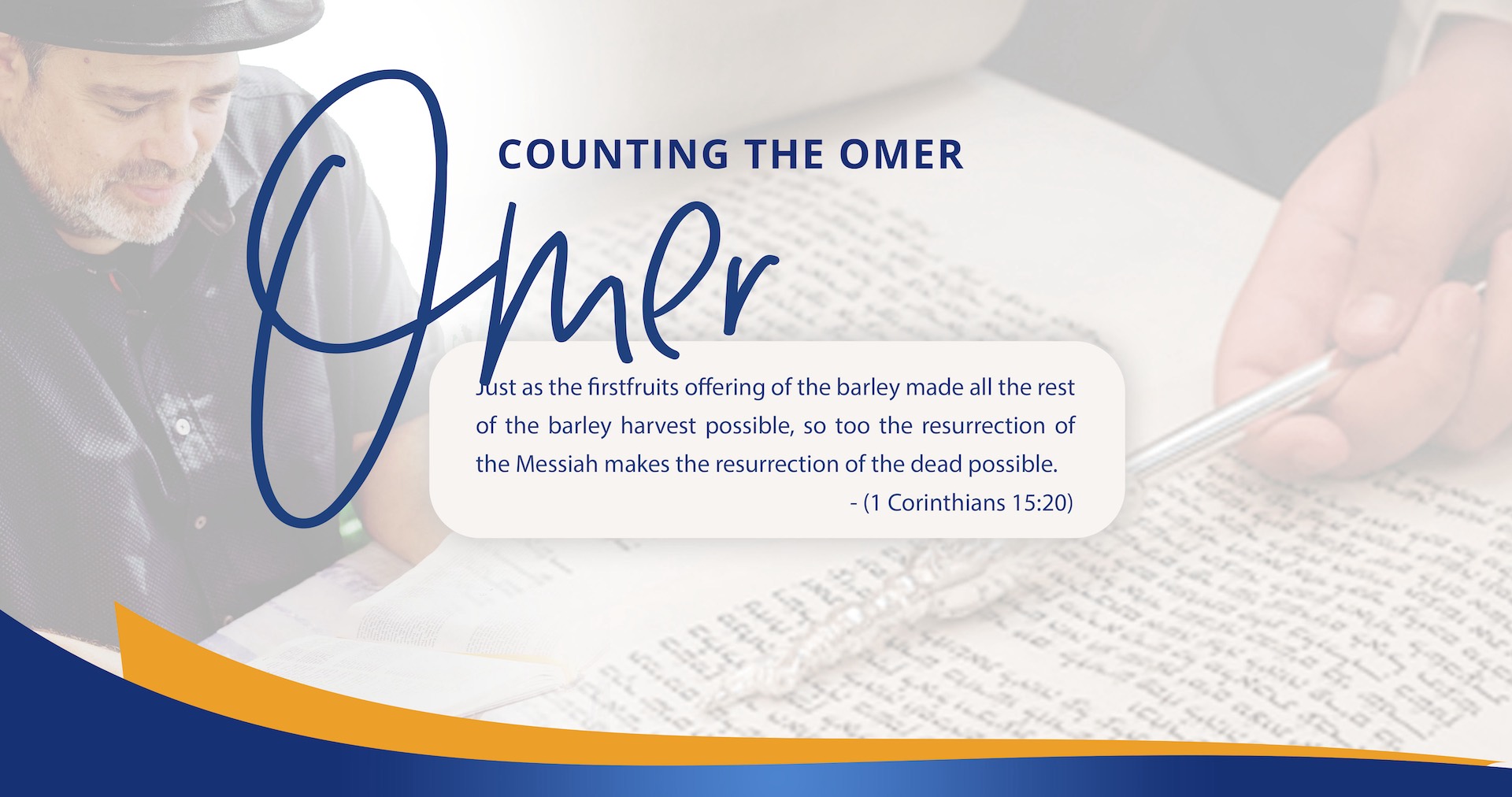
New Year’s Resolutions: Breakthrough | Rabbi Jason Sobel

New Year’s Resolutions: Breakthrough
Millions of people step into the New Year with “New Year’s resolutions.” This practice of setting goals for the upcoming year has its pros and cons, but as followers of Yeshua-Jesus, we need to ask ourselves:
what is the source of our goals and how do we hope to achieve them?
Proverbs 3:5 offers us wisdom in the resolution-making process: “Trust in Adonai with all your heart, lean not on your own understanding.” Our resolutions need to be reiterations of what God has already spoken over our lives!
Almost everybody knows the opening line of the world’s best-selling book: “In the beginning, God created the heavens and the earth.” But how did He do that? The answer lies in three simple words at the beginning of Genesis 1:3, “Then God said.” God created the universe through speech. It’s almost impossible to overstate the significance of this detail. We are, after all, made in the image and likeness of the Creator. Our speech is inherently powerful. I love what Rabbi Heschel wrote, “Words create worlds.”1
Before we go any further, I’d like to lay a two-part foundation for us. Part one involves a fascinating detail that many of you are about to discover for the first time. Unlike English and most other Western languages, Hebrew uses letters to write numbers. For example, while in English, we commonly use the Arabic numeral “1,” Hebrew writers use א” (aleph)—the first letter of the Hebrew alphabet, which has a numerical value of one. Each of the 22 Hebrew letters has a numerical value.
The second foundational pillar we need to establish is the Jewish calendar. Western nations organize time around the birth of Yeshua-Jesus. As you might remember from school, “A.D.” stands for the Latin phrase anno domini, meaning “in the year of our Lord.” While that is significant for followers of Yeshua, we should note that this calendar didn’t exist in His lifetime. The Jewish people organize their time from the creation of the world. There are two letters for this too: “A.M” as in the Latin phrase, anno mundi (“in the year of the world”). The Jewish year begins on Rosh Hashanah (lit. “the head of the year”). Our most recent Rosh Hashanah celebration ushered in the year 5782 (“A.M.”), the second year of the “80s.” That’s right, folks, the 80s are back!
In light of these two foundational concepts, we should take a closer look at the number 80 and the Hebrew letter used to represent it: peh פּ). It rhymes with “day.” Adding another layer of detail to this equation is the fact that peh also happens to be the Hebrew word for “mouth” (sounds just like the letter but is spelled פֶה). I believe we’re living in the decade of the mouth—a unique season in which we are uniquely anointed to open our mouths and declare God’s promises!
As we pull out our detective gear and start investigating the Scriptures, we will quickly notice a host of words and concepts linked to the letter peh (associated numerically with the current decade on the Jewish calendar, the 5780s). Most significantly, in Exodus 3, God called Moses to go to Egypt and confront Pharaoh (whose name begins with peh: פַּרְעֹה). Moses initially objected because he had “a slow mouth and a heavy tongue,” yet Adonai replied, “I will be with your mouth” (Ex 4:10,12 emphasis added). As we know, Moses did obey God’s voice and Israel was redeemed from slavery in Egypt. The Hebrew word for “redemption” is pidyon and it begins with—you guessed it—peh (פִּדְיֹ֣ן). One final link to consider: Israel’s liberation from over 400 years of slavery can be described as the ultimate “breakthrough” which, in Hebrew, is parats (פָּרַץ).
What does all of this mean for our lives at this moment? How should we live in light of this revelation? Why would God coordinate these sorts of details?
God wants us to experience His promises and step into our destiny in Him. But for this to occur, we need to participate. How? By using our peh! Healing is a powerful example of this truth. God wants His children to walk in divine health and wholeness. You might be familiar with the Hebrew word for healing—rapha. It is comprised of three letters: רפא. You might have noted that the middle letter is peh. Now consider what the Bible tells us, “Death and life are in the control of the tongue” (Prov 18:21). That statement isn’t merely metaphorical—it’s literal. Our bodies, our emotions, our minds all need healing, but oftentimes we “do not have because [we] do not ask” (James 4:2).
In this Decade of the Peh I believe that there is a powerful anointing on God’s people to open their mouths and ask!
Many people have been living with cumbersome (and actual) restrictions on their lives. The fallen world around us operates from a position of fear. Fear leads to control and constriction. Think about it: Pharaoh enslaved the Israelites because he feared they would “grow even more numerous, so that if war breaks out, they may join our enemies, fight against us, and then escape from the land” (Ex 1:10 emphasis added). The Hebrew name for Egypt is Mizraim, and it means “a place of confinement or restriction.” The people of God, however, operate from a position of faith. We need to use our mouths to declare and confidently proclaim with the Apostle: “If God is for us, who can be against us?” (Rom 8:31) It’s no coincidence that Moses confronted Pharaoh and led Israel’s breakthrough when he was 80 years old!
Friends, this “blueprint for a decade” has been given to us to change our mouths and minds. We need to daily speak and think differently. God is raising our vision to see the horizon of the Kingdom, not the confinement of Egypt. He wants us to remember that we’re people of purpose. We have a calling and a covenant—we’re heading to the Land of Promise! We may feel ill-equipped for breakthrough (like an 80-year-old shepherd with a “slow mouth and a heavy tongue” Ex. 4:10), but God is with us! Faith speaks when fear is silent. And in these “new 80s,” we will be silent no more!
Unless otherwise noted, all biblical passages referenced are in the Tree of Life Version
1Abraham Joshua Heschel, Moral Grandeur and Spiritual Audacity: Essays (New York: Farrar, Straus & Giroux, 2001), viii-ix.
FREE WEEKLY TORAH PORTIONS:
"This is so cool to know!"
What is Fusion with Rabbi Jason?
It is in looking back at what God has done that we can see forward to His future plans for us. “For I know the plans I have for you,’ declares the Lord, plans to prosper you and not to harm you, plans to give you hope and a future” Jer 29:11.
At Fusion Global with Rabbi Jason Sobel, we want to add definition to your faith as we restore the lost connection to our ancient roots and rediscover our forgotten inheritance.





